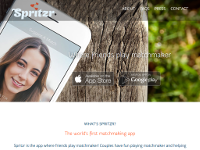Swipe, swipe, swipe. It may seem like a small gesture, but too much of it is mentally and emotionally draining.
Sustained effort is the key to success in all areas of life, including love, but if dating has become a part-time job, it's time to step back and hit the cosmic refresh button.
When you feel online dating fatigue setting in, try these strategies for getting back on track.
Refresh your profile. Maybe all you need to get excited about dating again is a makeover. Not the kind you get at a Macy's counter – the kind you can do from your couch. Swapping out your profile pic makes a new first impression and gives you an instant lift in attention. And while you're at it, switch up the written part of your profile. There's bound to be something outdated that needs a delete.
Cultivate other interests. Remember when you enjoyed things that didn't involve staring at a screen? It's time to bring those back. Step away from the digital device and recharge with something fun, challenging, calming – whatever it takes to make you feel rejuvenated, like a mental spa day. This is the perfect time to indulge in an old passion or test out a new one.
Schedule vacation periods. There's a reason you have vacation days at work. You can only do the same thing for so long before it drives you insane. Pencil in online dating freeze days every so often and use them to recharge. Work out, read, take a class, go shopping, or just veg-out on the sofa. Do whatever makes you feel good during your dating downtime.
Slow down. How many dates did you go on last month? Can you remember the last time you had coffee alone? Can you remember what it's like to ride public transportation without obsessively swiping? Too much of any good thing is a bad thing, online dating included. If you find your emotional energy feels drained, give yourself the gift of some much-needed alone time.
Revise your mindset. Dating – online or off – is rarely smooth sailing. You'll burn out quickly if you don't acknowledge the reality that, yes, sometimes it will suck. Sometimes you'll be bored. Sometimes you'll be hurt. Sometimes it will feel hopeless. Stay positive, have a sense of humor about it, maintain a balanced perspective, and manage your expectations in a healthy way.
Date offline. If you're tired of dating online, just... don't. Join a club, attend a meetup, go to the park. Meet dates the old-fashioned way and call it charmingly retro. Do people still say “duh?”



